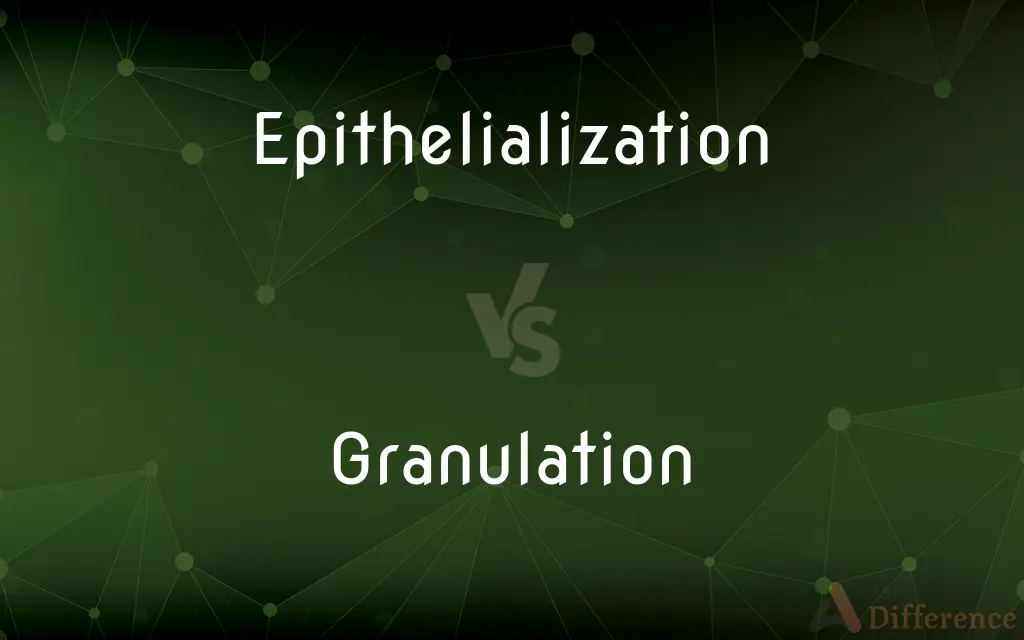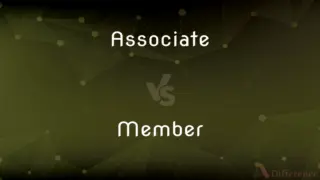Epithelialization vs. Granulation — What's the Difference?
Edited by Tayyaba Rehman — By Fiza Rafique — Updated on September 30, 2023
Epithelialization is the regrowth of skin over a wound, while Granulation involves the formation of new connective tissue and blood vessels during wound healing. Both are crucial phases in the wound healing process.

Difference Between Epithelialization and Granulation
Table of Contents
ADVERTISEMENT
Key Differences
Epithelialization and Granulation are essential processes in wound healing, albeit at different stages and with different purposes. Epithelialization pertains to the migration and growth of epithelial cells over a wound, creating a protective barrier. In contrast, Granulation is the initial phase where new connective tissue and minute blood vessels form on the wound's surface.
During the wound healing process, Granulation usually precedes Epithelialization. Granulation tissue, a temporary matrix, is rich in collagen and ground substances and appears reddish due to the abundant blood vessels. It provides the necessary scaffold for epithelial cells to migrate across and close the wound during the Epithelialization phase.
A distinguishing feature between Epithelialization and Granulation is their appearance and structure. While the former results in the formation of new skin, restoring the wound's appearance to near-normalcy, the latter has a lumpy, grainy texture, which is why it's referred to as "granulation tissue."
In summation, while both Epithelialization and Granulation play integral roles in wound healing, they occur at different phases, serve distinct purposes, and present unique characteristics.
Comparison Chart
Definition
Regrowth of skin over a wound
Formation of new connective tissue and vessels
ADVERTISEMENT
Phase in Healing
Occurs after granulation
Precedes epithelialization
Appearance
New skin, smooth surface
Reddish, grainy, "lumpy" texture
Purpose
Protective barrier, restores skin's appearance
Provides scaffold for epithelial migration
Clinical Significance
Indicates final stages of wound healing
Initial but vital phase of wound healing
Compare with Definitions
Epithelialization
The process of skin cell regrowth over a wound.
Epithelialization is crucial for protecting wounds against infections.
Granulation
The formation of new tissue in healing wounds.
Granulation tissue gives wounds their reddish appearance.
Epithelialization
The migration of epithelial cells to cover a wound's surface.
The speed of Epithelialization can vary based on wound type and care.
Granulation
Connective tissue and blood vessel growth during wound repair.
Without proper Granulation, wound healing can be delayed.
Epithelialization
The final stage in skin wound healing.
Once Epithelialization is complete, the wound is generally closed.
Granulation
A phase in wound healing preceding skin regrowth.
Granulation provides the foundation for epithelial cells to migrate.
Epithelialization
A phase in wound healing resulting in barrier restoration.
Proper wound care can accelerate Epithelialization.
Granulation
The grainy tissue appearing on healing wounds.
Overgrowth of Granulation tissue can impede proper wound closure.
Epithelialization
Re-establishment of the epidermis over a healing wound.
Epithelialization reduces the risk of scar formation.
Granulation
Granulation is the process of forming grains or granules from a powdery or solid substance, producing a granular material. It is applied in several technological processes in the chemical and pharmaceutical industries.
Epithelialization
To cover (a wound, for example) with epithelial tissue.
Granulation
The act or process of granulating.
Epithelialization
To become covered with epithelial tissue.
Granulation
The condition or appearance of being granulated.
Epithelialization
(biology) The process that covers a wound with epithelial tissue.
Granulation
Small, fleshy, beadlike protuberances, consisting of outgrowths of new capillaries, on the surface of a wound that is healing. Also called granulation tissue.
Epithelialization
(biology) The process of assembling an epithelium from non-epithelial cells, such as in the process of mesenchymal-to-epithelial transition.
Granulation
The formation of these protuberances.
Granulation
The small, transient, brilliant granular markings on the photosphere of the sun.
Granulation
The formation of granules, or of cereal grains.
Granulation
The forming of metals into granules by pouring them through a sieve into water while hot.
Granulation
(uncountable) The condition of being granulated.
Granulation
(medicine) Granulated tissue on the surface of a healing wound; granulation tissue.
Granulation
(astronomy) A bright, transient granular marking on the Sun's photosphere.
Granulation
The attachment of granules of precious metal to underlying metal of jewellery.
Granulation
The act or process of forming or crystallizing into grains; as, the granulation of powder and sugar.
Granulation
The state of being granulated.
Granulation
One of the small, red, grainlike prominences which form on a raw surface (that of wounds or ulcers), and are the efficient agents in the process of healing.
Granulation
New connective tissue and tiny blood vessels that form on the surfaces of a wound during the healing process
Granulation
The act of forming something into granules or grains;
The granulation of medicines
Granulation
Initial tissue formed during the body's repair process.
The presence of Granulation tissue indicates active wound healing.
Common Curiosities
Do Epithelialization and Granulation occur simultaneously?
No, Granulation typically precedes Epithelialization in the wound healing process.
Can wounds heal without Epithelialization?
While Granulation aids healing, without Epithelialization, the wound remains exposed and vulnerable.
Is Granulation always a sign of healing?
While Granulation tissue indicates healing, its overgrowth can be problematic.
Why might Granulation tissue overgrowth be concerning?
Overgrowth, or hypergranulation, can inhibit Epithelialization and delay wound closure.
Is Epithelialization the same as scarring?
No, while both involve wound healing, Epithelialization restores the skin's appearance, while scars are fibrous tissue replacements.
How do you promote Epithelialization?
Keeping wounds moist (not wet) and protected can encourage Epithelialization.
Why is Epithelialization important?
Epithelialization restores the skin barrier, protecting against infections and further injury.
What gives Granulation tissue its reddish appearance?
The abundance of new blood vessels gives Granulation tissue its characteristic red hue.
Can you speed up the Granulation process?
Yes, proper wound care, including moisture balance and infection control, can promote Granulation.
Do all wounds undergo Epithelialization?
Most skin wounds do, but the depth and type of wound can affect the Epithelialization process.
Can a wound fully heal without Granulation?
Granulation provides a scaffold for epithelial cells, making it crucial for comprehensive wound healing.
Why is the texture of Granulation tissue grainy?
The "lumpy" texture results from the formation of new connective tissue and blood vessels.
What factors might delay Epithelialization?
Infections, wound dryness, or underlying health conditions can hinder Epithelialization.
How is Granulation tissue different from scar tissue?
Granulation is temporary and rich in blood vessels, while scar tissue is fibrous and permanent.
Can both Epithelialization and Granulation be seen in chronic wounds?
Yes, but chronic wounds might experience delayed or inhibited Epithelialization and Granulation.
Share Your Discovery

Previous Comparison
Nepal vs. Tibet
Next Comparison
Associate vs. MemberAuthor Spotlight
Written by
Fiza RafiqueFiza Rafique is a skilled content writer at AskDifference.com, where she meticulously refines and enhances written pieces. Drawing from her vast editorial expertise, Fiza ensures clarity, accuracy, and precision in every article. Passionate about language, she continually seeks to elevate the quality of content for readers worldwide.
Edited by
Tayyaba RehmanTayyaba Rehman is a distinguished writer, currently serving as a primary contributor to askdifference.com. As a researcher in semantics and etymology, Tayyaba's passion for the complexity of languages and their distinctions has found a perfect home on the platform. Tayyaba delves into the intricacies of language, distinguishing between commonly confused words and phrases, thereby providing clarity for readers worldwide.












































